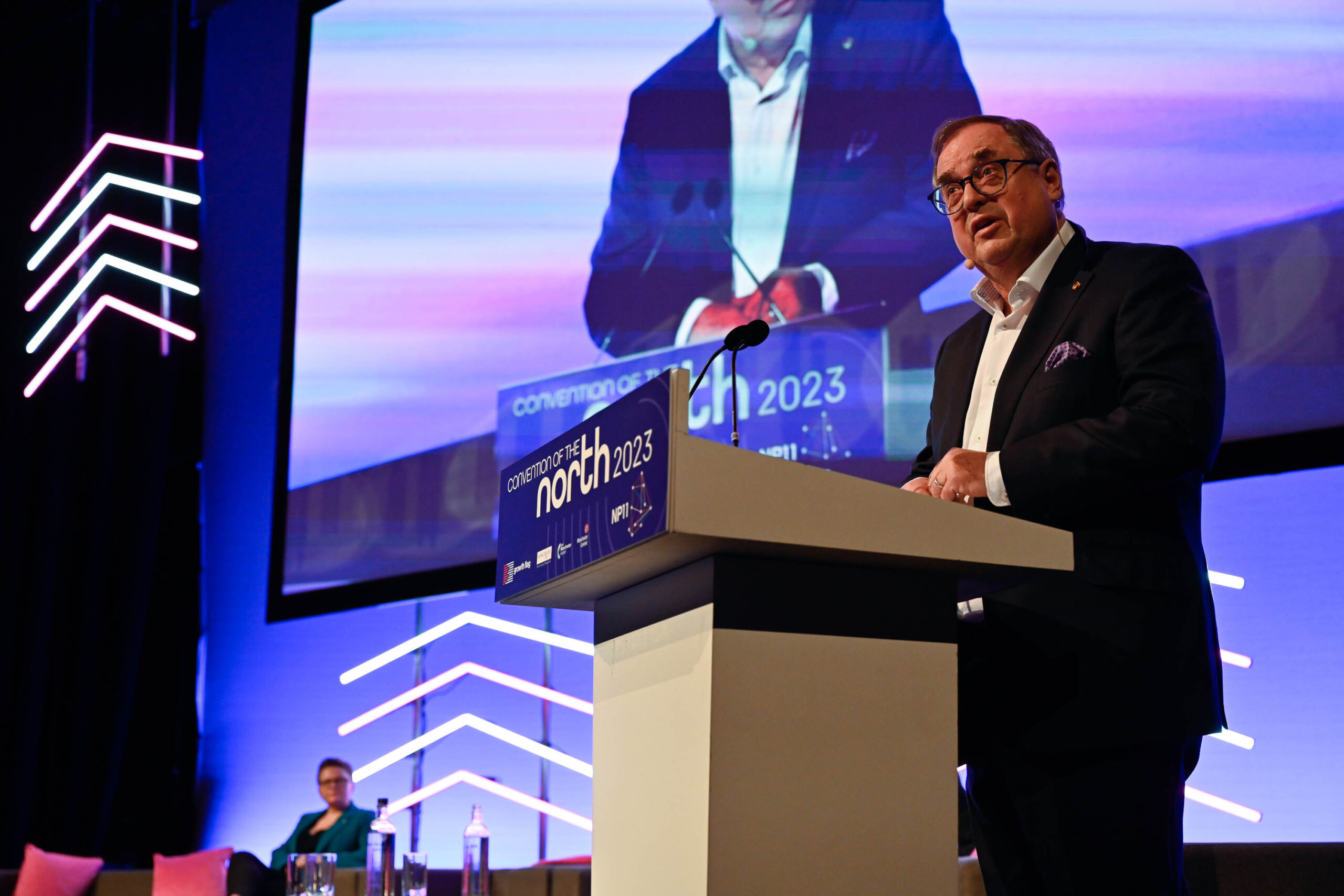We at Social were proud to support our third Convention of the North last month, on behalf of our client, the NP11 group of northern local enterprise partnerships.
As a northern-based business, it’s always a pleasure to be at the heart of the debate around the future of the North and what businesses and communities need to thrive.
This year’s Convention was held in Manchester and chaired by Cllr Bev Foster, Leader of Manchester City Council, and Sir Roger Marsh OBE DL, Chair of the NP11, with esteemed broadcast journalist, Evan Davis, leading the proceedings. As well as high-profile involvement from Northern metro mayors, the event also featured keynote addresses from Secretary of State for Levelling Up, Housing and Communities, the Rt Hon Michael Gove, and Shadow Secretary of State, Labour’s Lisa Nandy.
Our Head of Strategy, who has been involved in the previous Conventions in Rotherham in 2019 and Liverpool in 2022, reflects on the key takeaways from the 2023 event…
1. Levelling Up is still ‘A Thing’
The run-up to this year’s Convention left many wondering whether Levelling Up, which was the centrepiece of Michael Gove’s speech in Liverpool last year, would even be ‘A Thing’ this time around. Just days before the Convention, it was announced that the Government’s proposals for a series of regional “Levelling Up Directors” were being scrapped. This followed speculation that the term “levelling up” itself was being phased out by the Sunak Government, with the Prime Minister said to favour the somewhat less snappy “gauging up” instead.
However, levelling up was very much still the talk of the town in Manchester Central – in language and in substance. The morning of the Convention, Northern metro mayors and Sir Roger Marsh of the NP11, called for levelling up to be “hard-wired” into law, ensuring that all regions can close gaps in living standards and boost their economic prosperity. Both Michael Gove and Labour’s Shadow of Secretary of State, Lisa Nandy, reiterated the importance of levelling up those parts of the UK that currently under-perform economically – not just for the sake of the people who live in those regions, but for the country as a whole. This was echoed by all the business and community leaders and academics who participated in the day.
That levelling up shouldn’t continue to be a central mission of government policy was therefore not in doubt. However, there were questions around the boldness of policy action to deliver on the promise of levelling up and whether initiatives to date have had a meaningful impact.
Spoiler: the general view in the room was that they haven’t, particularly in light of research by IPPR North, published that morning, which found that if the North of England were a country, it would be second only to Greece for the lowest levels of investment in the OECD.
As other think-tanks have done previously, IPPR North pointed to Germany as an international exemplar of successful levelling up, highlighting that long-term job creation is 16 percentage points higher in Leipzig, Eastern Germany, than in the North of England.
Empowered local leadership, a constitutional commitment to reducing regional disparities and substantial investment were all hailed as drivers of this success, as the Convention heard directly from Minister of State for East Germany and Equivalent Living Conditions, Carsten Schneider, in a pre-recorded video address. The long-term, cross-party commitment and multi-decade investment that Herr Schneider spoke about seemed a far cry from the current UK approach of competitive bidding for relatively small, short-term pots of money, which had received its fair share of criticism from council leaders and Conservative and Labour mayors alike in the days leading up to the Convention…
2. The devolution genie is out of the bottle
Instead of pitting councils against each other in a “Hunger Games-style” beauty parade, to paraphrase Labour’s Lisa Nandy, the consensus in the room was for greater devolution, with long-term funding settlements that would enable local areas to develop long-term economic strategies and invest in projects that will offer the greatest benefits to communities.
What was striking about the tone of both Mr. Gove and Ms. Nandy’s speeches, compared with previous Convention keynotes, was the extent to which they were pitching their parties’ respective visions for accelerated devolution to local leaders, rather than expecting those leaders to continue dancing to a tune composed and sung in Westminster. Mr. Gove announced extensions to existing devolution arrangements for the Tees Valley, West Midlands and Greater Manchester, with GM Mayor, Andy Burnham, on the cusp of securing a “trailblazer” deal with the Government over devolution of post-16 skills.
Those Mayors in the room who weren’t name-checked as trailblazers by the Secretary of State – and those areas such as Cheshire and Warrington, Cumbria and Lancashire, which are still seemingly waiting for a conversation with Government about their devolution ambitions – might have had pause for concern. Perhaps this is why Ms. Nandy received arguably the biggest round of applause of the day with her vision for a radically different relationship between central and local government. Instead of councils and combined authorities having to come cap in hand to Whitehall with their begging bowls, she envisaged a role reversal, with central government investment driven by local priorities and investment plans instead.
The Convention made clear that, as a leader in the Guardian this week stated, English devolution is an idea “whose time has come”. The cross-party consensus on the need for greater local leadership was certainly welcomed by attendees. In an impromptu show of hands instigated by Evan Davis, not a single person in the 1,000-strong delegation raised theirs in favour of continued central control of pounds and powers. Indeed, there were many impassioned please from panellists and from the floor for a more people-centred approach to policymaking, with young people in particular having a much stronger role in shaping the future of their places.
3. Plus ça change, plus c’est la même chose…
Much has changed in the year since the 2022 Liverpool Convention but once thing has unfortunately remained the same: the parlous state of the North’s transport network, and particularly its trans-Pennine rail connections.
Despite a plea from Convention Co-Chair, Cllr Bev Craig, at the start of the day for “optimism and hope”, the travails that many attendees had undergone to get to Manchester from Yorkshire and the North East, meant that transport was a dominant theme throughout the day. Delegates voted it as the number one challenge the North faces in a Sli.do poll and, at a lunchtime press conference, Northern Mayors called for TransPennine Express to be stripped of their franchise.
West Yorkshire’s Mayor, Tracy Brabin, referred to reliable transport as a “human right” and spoke of the opportunities northerners are missing out on because of inadequate rail performance. From getting to work, education or training, being able to access childcare, and the safety of women and girls – transport impacts all aspects of people’s lives, and unless there’s firm commitment to fixing the North’s transport challenges – especially the commitment to delivering Northern Powerhouse Rail with a city centre stop in Bradford – it’s hard to see how broader levelling up will be delivered.
4. The (Green) Revolution will be Northernised…
Some might argue that Net Zero didn’t feature as prominently as it could have in the plenary discussions, however Northern business leaders were clear that backing the North to lead the UK’s Green Industrial Revolution not only presents one of the biggest opportunities to create highly skilled jobs and level up the North’s economy; it’s also a massive opportunity for UK plc.
With the recently released Skidmore Review making clear the scale of economic opportunity of the global transition to Net Zero, the NP11 argued that a Northern-led Green Industrial Revolution is a ready-made solution to help the UK seize a hefty slice of the international pie. The North already generates more than 50% of England’s renewable energy and is decarbonising 13% faster than the UK as a whole. The NP11’s research sets out the potential to unlock more than £6 billion in economic benefits for just £10 million government investment in work to encourage collaboration between the North’s world-leading net zero assets. In turn this could create over 100,000 skilled jobs and add £2 billion-a-year to the UK economy by 2050, while also helping to realise the Government’s Net Zero targets.
As the NP11 Chair, Sir Roger Marsh, said in his opening address to the Convention, “the question isn’t why back the North, but why wouldn’t you?”.
5. Next stop West Yorkshire!
After probably the most high-profile and successful event to date, the baton has been formally handed over to West Yorkshire to host the 2024 Convention of the North. The conversations during this year’s Convention – particularly as the first event on this scale post-Covid – gives the North a strong foundation and sense of shared purpose to build on over the coming year and we’ll be following the debate eagerly.


